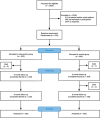Cost-utility of an eHealth application 'Oncokompas' that supports cancer survivors in self-management: results of a randomised controlled trial
- PMID: 32656739
- PMCID: PMC7822793
- DOI: 10.1007/s11764-020-00912-9
Cost-utility of an eHealth application 'Oncokompas' that supports cancer survivors in self-management: results of a randomised controlled trial
Abstract
Purpose: The eHealth self-management application 'Oncokompas' was developed to support cancer survivors in monitoring health-related quality of life (HRQOL) and symptoms, and obtaining personalized feedback and options for supportive care. The aim of this study was to assess the cost-utility of Oncokompas compared with care as usual (CAU) among cancer survivors.
Methods: Survivors were randomly allocated to the intervention or control group. Direct (non-)medical, indirect non-medical costs, and HRQOL were measured at 3- and 6-month follow-up, using iMTA Medical Consumption and Productivity Costs and the EuroQol-5D questionnaires. Mean cumulative costs and quality-adjusted life-years (QALYs) were compared between both groups.
Results: In total, 625 survivors were randomized into intervention (n = 320) or control group (n = 305). Base case analysis showed that incremental costs from a societal perspective were - €163 (95% CI, - 665 to 326), and incremental QALYs were 0.0017 (95% CI, - 0.0121 to 0.0155) in the intervention group compared with those in the control group. The probability that, compared with CAU, Oncokompas is more effective was 60%, less costly 73%, and both more effective and less costly 47%. Sensitivity analyses showed that incremental costs vary between - €40 and €69, and incremental QALYs vary between - 0.0023 and - 0.0057.
Conclusion: Oncokompas is likely to be equally effective on utilities, and not more expensive than CAU, and will therefore contribute to sustainable cancer survivorship care in a (cost-)effective manner.
Implications for cancer survivors: Oncokompas seems to improve HRQOL and reduces the burden of several tumour-specific symptoms, while costs from a societal perspective are similar to CAU.
Keywords: Cancer survivorship; Cost-utility; Quality of life; Self-management; Supportive care; eHealth.
Conflict of interest statement
IMV-dL has received grants from the Dutch Cancer Society (KWF Kankerbestrijding), Pink Ribbon, the Netherlands Organization for Health Research and Development (ZonMW), the SAG Foundation–Zilveren Kruis Health Care Assurance Company, Danone Ecofund–Nutricia, Red-kite (distributor of eHealth tools), and Bristol-Myers Squibb, during the conduct of this study. CRL has received personal fees for global advisory board participation from MSD, during the conduct of this study. All other authors have no conflicts of interest.
Figures
References
-
- Howell D, Harth T, Brown J, Bennett C, Boyko S. Self-management education interventions for patients with cancer: a systematic review. Support Care Cancer. Springer Berlin Heidelberg. 2017:1323–55. - PubMed
Publication types
MeSH terms
LinkOut - more resources
Full Text Sources
Medical



